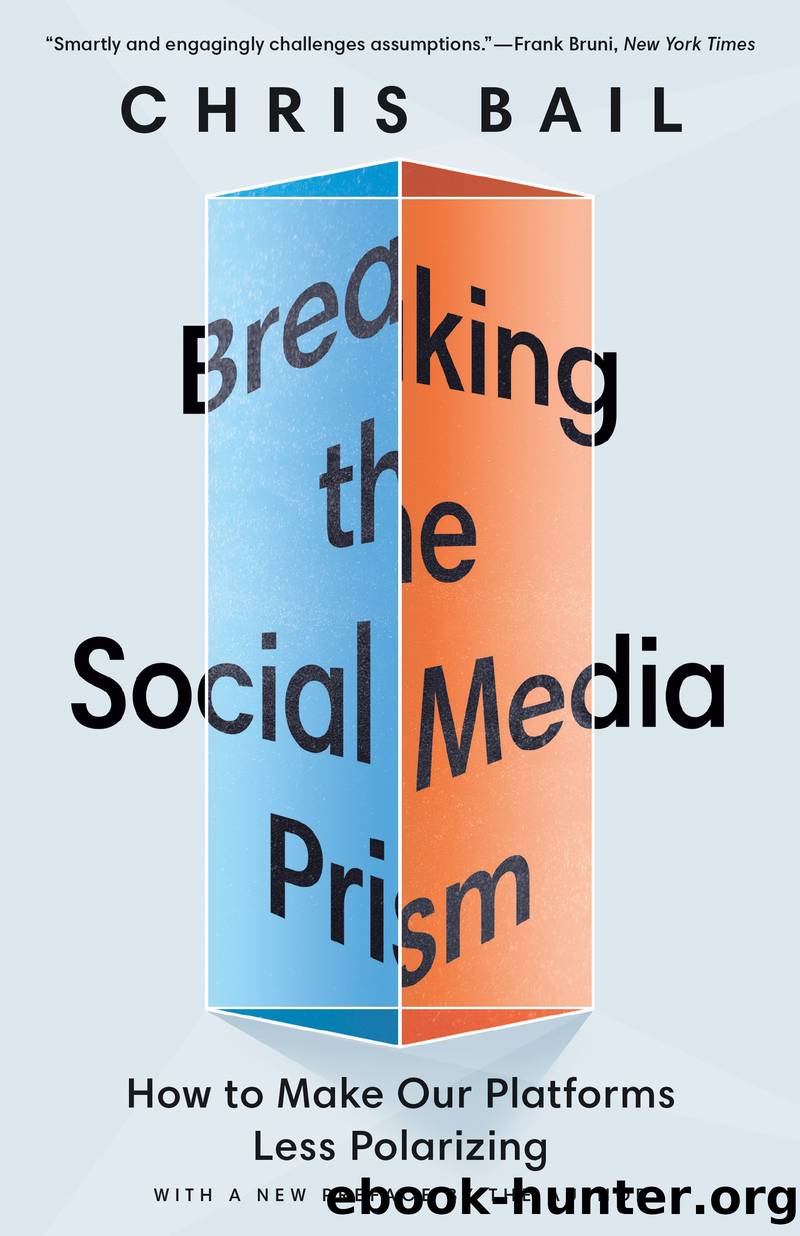Breaking the Social Media Prism by Chris Bail

Author:Chris Bail
Language: eng
Format: epub
Publisher: Princeton University Press
Published: 2020-12-29T00:00:00+00:00
Platforms with a Purpose
The DiscussIt experiment is one of the few success stories in fighting political polarization on our platforms that I know of. But could a platform like DiscussIt really scale? Even if people were willing to jettison parts of their identities for more productive debates in the short term, would they continue to do so as the platform expanded to include thousandsâor even millionsâof users over weeks, months, or years? Would the dialogue remain so civil after trolls or extremists arrived? And would the promise of more-productive conversations about politics be compelling enough to make people keep coming back? Or would a platform like ours make an inglorious exit to the graveyard of social media?
To answer these questions, we need to revisit the core argument Iâve made throughout this book about why people use social media in the first place. In chapter 4, I argued that people keep coming back to social media because they help us do something that makes us distinctively human: create, revise, and maintain our identities to gain social status. Social media allow people to present different versions of themselves, monitor how others react to those versions, and revise their identities with unprecedented speed and efficiency. But we humans are notoriously bad at judging what other people think of usâand the fleeting interactions we have with each other on social media make matters even worse. As I described in chapters 5 and 6, the social media prism fuels extremism, mutes moderates, and leaves most of us with profound misgivings about the other side. But we wonât stop using social media any sooner than we will stop caring about our identities and social status. Instead, we need to think more about how the design of our platforms shapes the types of identities we create and the social status we seek.
What is the purpose of Facebook? The company tells us its mission is to âbring the world closer together.â28 But the platform began as a sophomoric tool that Harvard undergraduates used to rate each otherâs physical attractiveness. What is the purpose of Twitter? Its motto is to âserve the public conversation,â but it was reportedly built to help groups of friends broadcast SMS-style messages to each other.29 What is the purpose of Instagram? Weâre told it is to âcapture and share the worldâs moments.â But the app was originally called âBurbnâ (as in the drink) and was built to help people make plans to hang out with their friends.30 What is the purpose of TikTok? Iâm not even going to go there. Hopefully, my point is already clear: Should we really expect platforms that were originally designed for such sophomoric or banal purposes to seamlessly transform themselves to serve the public good? Should we be surprised when they create the kind of leaderless demagoguery from which anyone can invent a kind of status, no matter how superficial or deleterious to democracy? Is it any wonder that people find themselves so rudderless on social media, when there
Download
This site does not store any files on its server. We only index and link to content provided by other sites. Please contact the content providers to delete copyright contents if any and email us, we'll remove relevant links or contents immediately.
| Blogging & Blogs | eBay |
| E-Commerce | Hacking |
| Online Searching | Podcasts & Webcasts |
| Search Engine Optimization | Social Media |
| Social Media for Business | Web Browsers |
| Web Marketing |
Sass and Compass in Action by Wynn Netherland Nathan Weizenbaum Chris Eppstein Brandon Mathis(7411)
Grails in Action by Glen Smith Peter Ledbrook(7303)
Secrets of the JavaScript Ninja by John Resig Bear Bibeault(5968)
Kotlin in Action by Dmitry Jemerov(4653)
Mastering Azure Security by Mustafa Toroman and Tom Janetscheck(3034)
Learning React: Functional Web Development with React and Redux by Banks Alex & Porcello Eve(2844)
WordPress Plugin Development Cookbook by Yannick Lefebvre(2625)
Mastering Bitcoin: Programming the Open Blockchain by Andreas M. Antonopoulos(2518)
The Art Of Deception by Kevin Mitnick(2303)
Drugs Unlimited by Mike Power(2195)
Kali Linux - An Ethical Hacker's Cookbook: End-to-end penetration testing solutions by Sharma Himanshu(2102)
Writing for the Web: Creating Compelling Web Content Using Words, Pictures and Sound (Eva Spring's Library) by Lynda Felder(2068)
SEO 2018: Learn search engine optimization with smart internet marketing strategies by Adam Clarke(2022)
JavaScript by Example by S Dani Akash(1951)
Wireless Hacking 101 by Karina Astudillo(1851)
DarkMarket by Misha Glenny(1849)
Full-Stack React Projects by Shama Hoque(1777)
Social Selling Mastery by Jamie Shanks(1752)
Hack and HHVM by Owen Yamauchi(1680)
